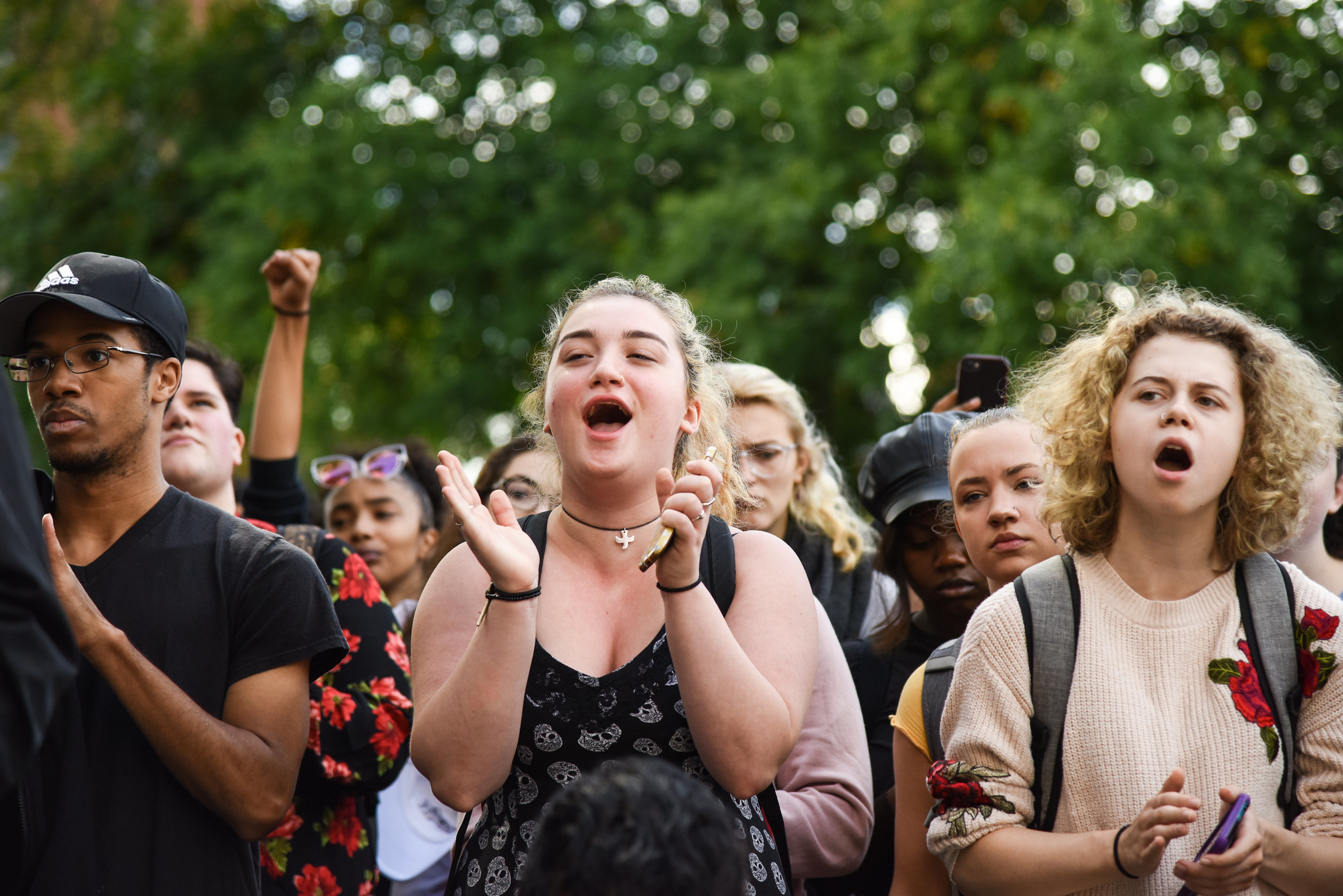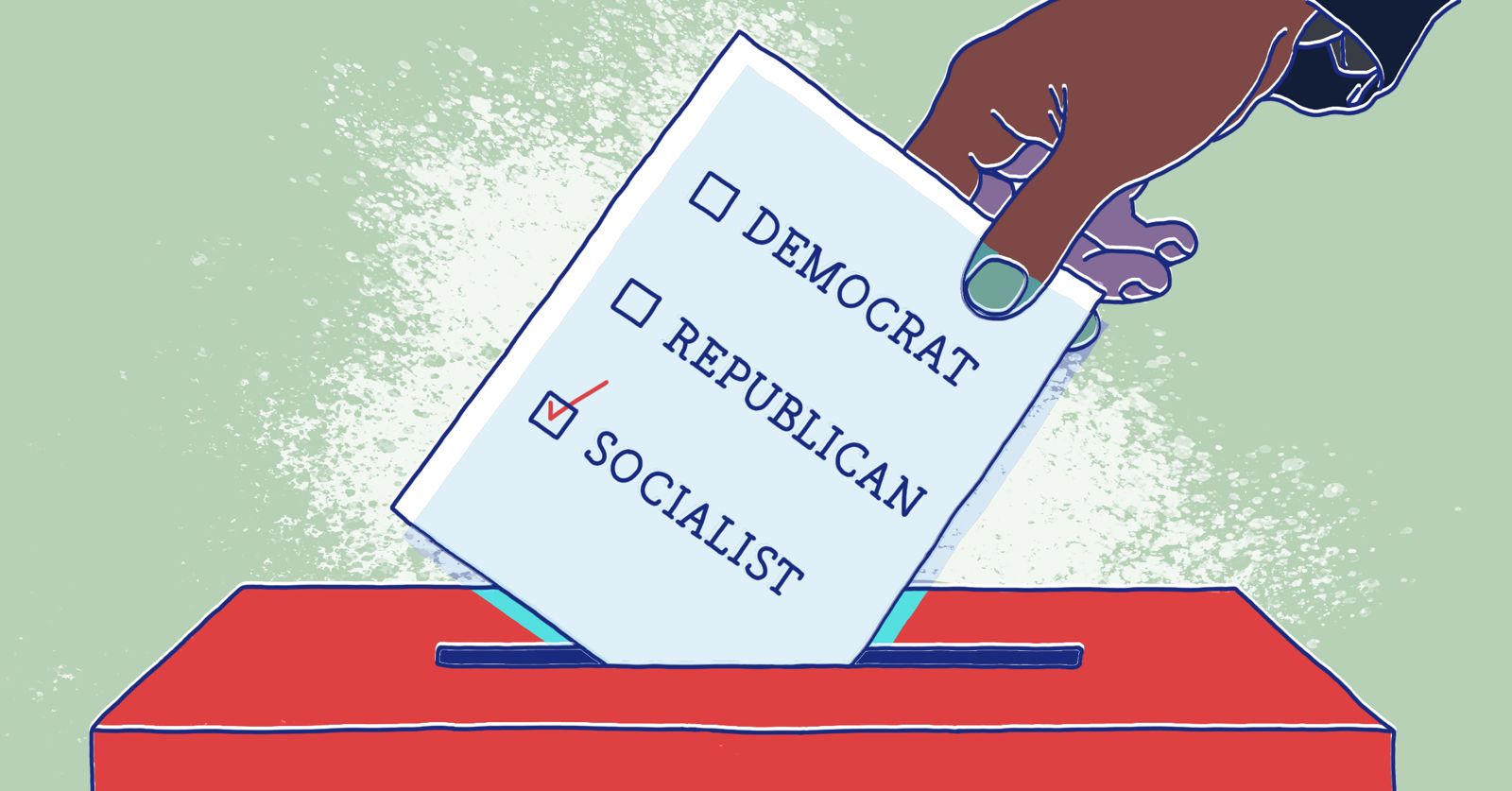Having discussions with comrades in chapters all over the country has revealed a tension many chapter leaders are feeling over how to involve DSA in the uprisings against white supremacy and police violence precipitated by the murders of George Floyd and Breonna Taylor and the related political demands. This piece is intended to hopefully provide some practical advice for chapter leadership looking to organize in support of this uprising.
These protests arose fairly spontaneously, and the continuing protests are often being organized on the fly. Any attempt to steer their overall direction has a practical limit for any organization, and given the predominantly white composition of DSA chapters that is doubly true. Socialist organizations however can’t afford not to be involved in providing solidarity and even leadership in an uprising against white supremacy that is central to creating a unified and self-aware, working-class movement.
The impulse against overstepping the appropriate role of a for-now predominantly white organization in these uprisings is to my mind a good initial impulse. It is a major departure from what socialist organizations of the past have done, which is hijack or exploit moments like this. That pattern of behavior in the past has cost the current socialist movement dearly, often among Black radicals who have experienced firsthand that conduct. It is important to note: This is not because of “optics,” it is for practical political reasons. An organization without firm roots and deep connections to a community will be limited in how it can organize within and make demands alongside it, and the absence of operational familiarity and trust can have very negative consequences.
But that initial impulse shouldn’t immobilize chapters. DSA can’t shirk its responsibility as a socialist, mass organization aspiring to build a multiracial, working-class movement.
Local contexts will vary. In Chicago, for example, the tradition of Black and brown radicalism and Black-led radical organizations is dynamic, very deep, and the political milieu is complex. On top of that, today’s socialists pay the cost for the conduct of socialist organizations of the past. Even isolated negative experiences can reverberate for years in local contexts where the world of radical organizing is very small. Being measured and sensitive to political realities is a virtue. Disdain towards nuance and subtlety is a vice.
Be Specific About Solidarity and Leadership
As stated above, the purpose of this article is to offer some practical suggestions as to how chapters can address what is an understandable impulse.
Starting from the position of not imputing bad faith, chapters can find their footing. Part of the problem may be that with the speed of events, chapter leadership groups have not had the space and oxygen to have a thoughtful discussion about what it actually, practically means to engage in solidarity versus “assuming leadership.”
That is, rather than trying to establish abstract first principles about what a socialist organization “should” do, start from a position of defining what it means, not in the abstract, but in practice, to engage in solidarity work versus providing leadership. When does “solidarity” tip into “assuming leadership” in a politically counterproductive way? There must be some objective measures you can use. Take the time to have this discussion and even go as far as to draw up a list. Be specific. Would we include using the chapter’s logistical and planning capacity and volunteers to convene or host groups together to plan an action as solidarity? If so, how can we be sure that meeting is productive and that all the groups involved engage in mutual decision-making?
Questions can and should be asked in the negative, too: Is just sharing information on social media and anonymously “showing up” solidarity? If so, how is that different from what any number of liberal groups are doing? Should a socialist organization set its definition of solidarity at the level of “allyship” NGOs? I think that whatever the disparate politics in a chapter, most members would agree that solidarity has to mean something more than what just about every liberal nonprofit is doing. And frankly for those who don’t, it would be useful to know that and understand what the political education needs may be.
By being specific, hopefully at a minimum understandably confused members can be coaxed out of immobilization. Here are things that are solidaristic in character, and that therefore we should be doing; here are things that are politically fraught given the context, or which are beyond our comfort zone; here are practices we should check off before we put forward demands, organize an event, etc. A list might not even be everything you would want it to be, but by having some set of criteria you can at least set tasks and a program and move people into action that could develop their confidence further.
For areas where there may be no organized groups to collaborate with, having this internal discussion could still be fruitful — maybe particularly so. Members and leadership need to have a clear sense of why tactical decisions are being made, and those should not be just abstractions. (“We need to step back in this moment.”) Start the discussion among leadership for the purpose of clarifying what everybody thinks on at least the following questions.
- What is the ideal role of a socialist organization at a time of uprising especially against white supremacy? (In turn, how do the limits of our organization impact this ideal program?)
- What can a democratic, member-funded socialist organization with a socialist vision provide that other organizations cannot?
- What does it mean, specifically, to engage in organizational (not just individual) solidarity both with unorganized communities and formal organizations?
- What does it mean, specifically, to assume leadership, and what are the risks of doing so and of not doing so?
What is critical is that people in leadership and the membership understand even their own reasons for choosing or refraining from a particular course of action or set of actions and talk about them frankly. And, hopefully, arriving at an understanding that doing the bare minimum is not an option. Speaking out loud to individual leaders’ concerns and fears over being seen as interlopers, etc. is healthy, and frankly a necessary first step to what is most important: deciding on what can be done.
The guiding star is following and being a meaningful part of an organic movement. Within different communities there will be variable viewpoints, strategies, and institutions. It is important that a mass socialist organization with the goal of forging a multiracial working-class movement not shrink from developing solidarity practices and providing leadership when necessary. Leadership therefore has a responsibility to discuss and debate openly the practices, limitations, and opportunities the organization is facing and laying out a strategy for doing everything they can within political limitations.
Of course, every chapter is different and local context matters. Chapters cannot allow themselves to fight shadows and immobilize themselves out of fear of bad faith criticisms. So it is important to take the time to have the political conversation. Rather than shrugging off those concerns, clarifying them in the open and building out a shared understanding of what is holding people back or pushing them forward is a practical approach to rallying leadership and members towards a program. If people understand their differing definitions of solidarity, for example, that can ease some of the instinctual pushback against taking more visible action.
As is often the case, having political discussions in concrete terms can go a long way to solving problems, or at a minimum reaching a consensus that allows for progress. We are all busy, things are hectic, but we should never get in the habit of giving up on or bypassing political discussion. It is not just a checkbox, it is at the very heart of what makes our organization strong. Take the time for it, even at the expense of speed.




